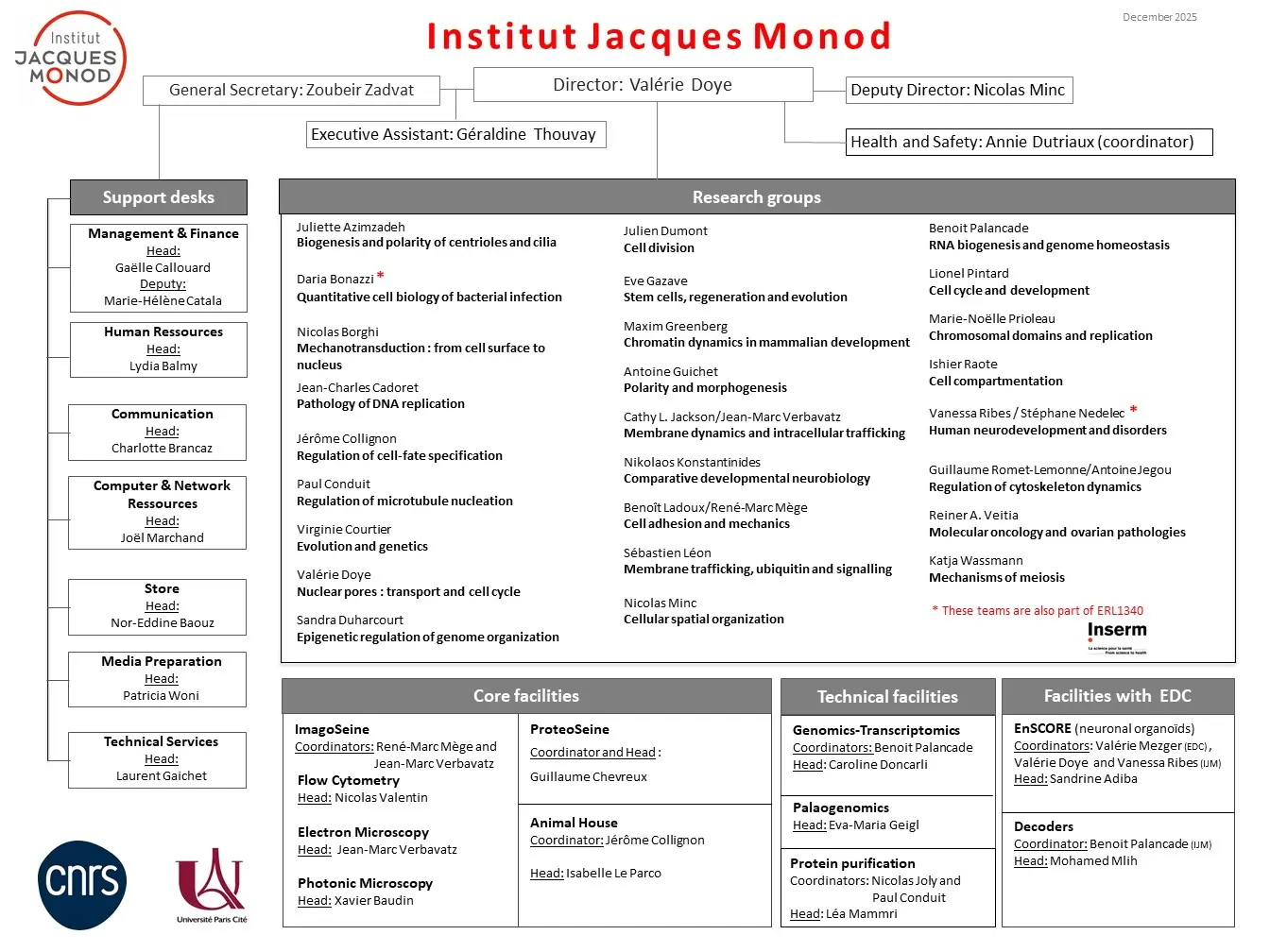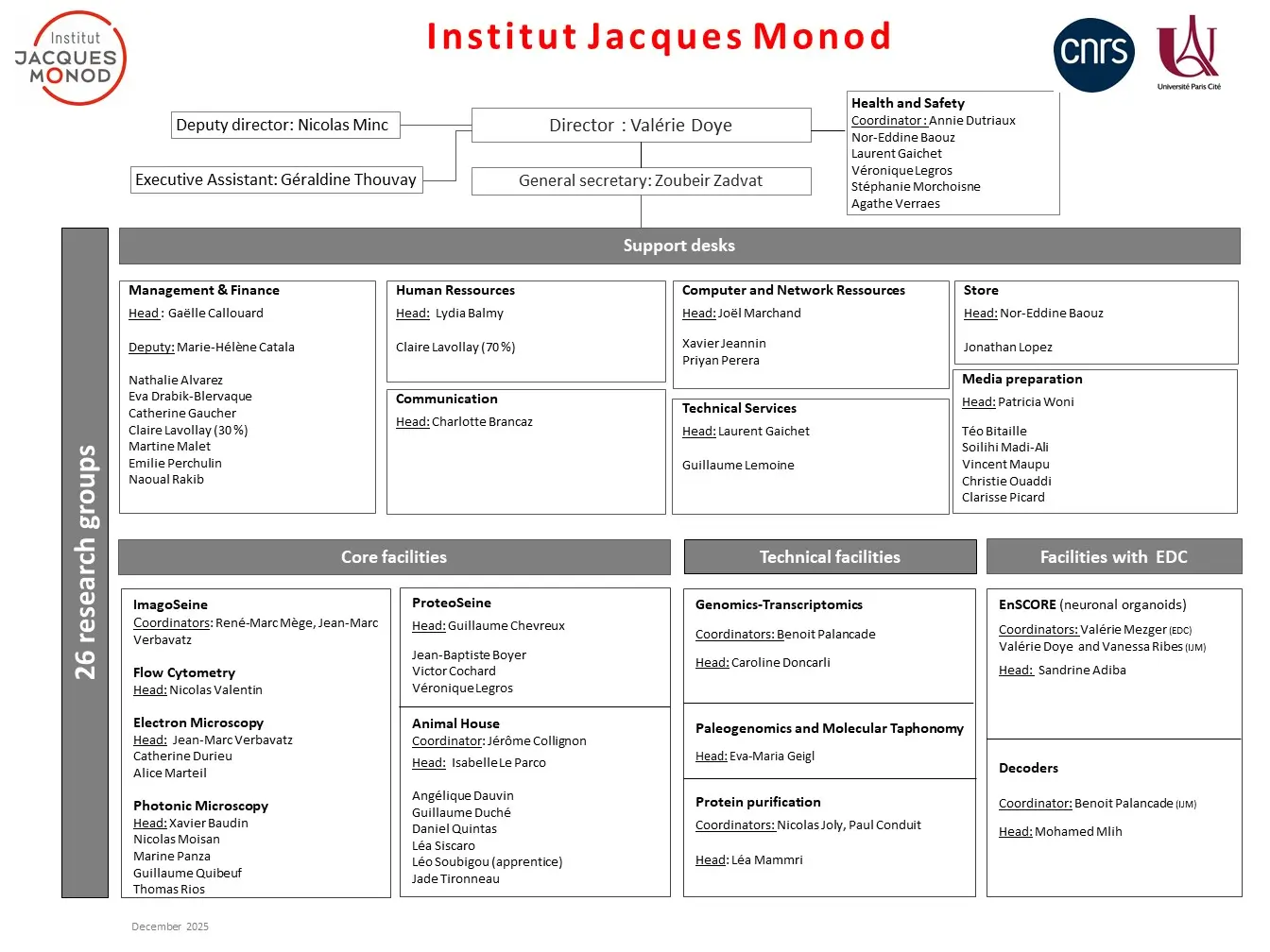Management and organization of the Institut Jacques Monod
Directrice : Valérie Doye
Valérie Doye becomes the new Director of the Institut Jacques Monod as of September 1, 2023, succeeding Michel Werner, who has held this position since 2018. She will be assisted by new deputy director Nicolas Minc.
Valérie Doye is Director of Research at the Institut Jacques Monod, and head of the “Unconventional functions of nuclear pores” team.
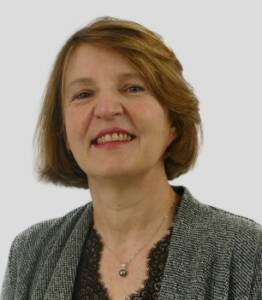
After defending her doctoral thesis in 1991 at the Université Pierre et Marie Curie on the cellular differentiation of neurons, Valérie Doye undertook a post-doctorate until 1994 at the European Molecular Biology Laboratory (Heidelberg, Germany). There, she specialized in the components of nuclear pores, nucleoporins, and their role in transport between cytoplasm and nucleus. In 1994, she joined the CNRS, then developed her research team at the Institut Curie, where she characterized the role of nucleoporins in nuclear pore assembly, as well as some of their unconventional functions in cell division and genome integrity. In 2008, she moved her team to the Institut Jacques Monod. In 2009, she was awarded the CNRS Silver Medal for her research work. Head of the cell biology program and member of the Institut Jacques Monod management committee, she became deputy director in 2020.
Currently, the Doye team is studying the functions of nucleoporins in nuclear pore assembly, signaling and gene regulation during cell differentiation. To this end, the team uses pluripotent stem cells and their differentiated derivatives, notably in the form of organoids. This work should help us to understand why, despite the universal role of nuclear pores in all nucleated cells, certain nucleoporins are linked to human hereditary diseases affecting specific cell types and organs.
Executive Assistant : Géraldine THOUVAY Contact
Téléphone: +33 (0)1 57 27 81 42
Deputy Director : Nicolas Minc
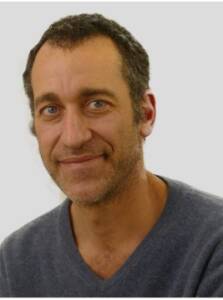
Nicolas Minc is a physicist and biologist. After defending his doctoral thesis at the Curie Institute in 2005, he completed a postdoctoral fellowship at Columbia University (New York, USA) and became interested in cellular morphogenesis in yeast and sea urchin embryos by combining approaches from physics. In 2013, he set up his research team “Spatial organization of the cell” at the Jacques Monod Institute. The same year, he received the Emergence(s) Prize from the City of Paris. In 2014, he was awarded the ERC Consolidator Grant for the FORCASTER project: Force, Motion and Positioning of MT asters and in 2018, he received the CNRS bronze medal.
Currently, the Minc team is studying how cells establish their particular morphology and internal organization in order to perform their given functions. The team takes a broad and multidisciplinary approach to this problem and uses different organisms to identify the general principles that control cell morphogenesis. One of the team’s hallmarks is to integrate and develop cutting-edge quantitative approaches, such as microfabrication, mathematical modeling, and image analysis tools, to address fundamental questions of morphogenesis. To achieve these goals, the Minc team combines expertise from different fields, including chemistry, biology, and physics.
Secretary General : Zoubeir ZADVAT
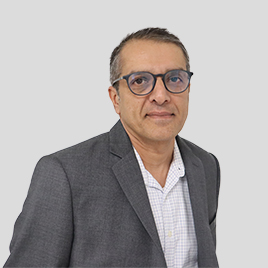
Secrétaire général
Ingénieur de recherche CNRS
Tél: +33 (0)1 57 27 81 38 / Contact
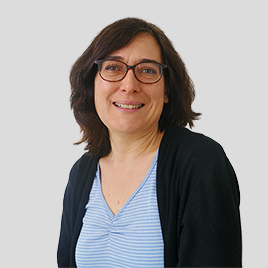 Juliette AZIMZADEH is a CNRS Research Director and head of the “Biogenesis and Polarity of Centrioles and Cilia” team. She first studied the cytoskeleton of plants during her thesis at the Jean-Pierre Bourgin Institute, and then became interested in the architecture of centrioles during a first postdoctoral fellowship at the Curie Institute, followed by a second at the University of California, San Francisco. Her team, created in 2013 with ATIP-AVENIR funding, studies the mechanisms underlying the assembly and positioning of centrioles and cilia in animal cells.
Juliette AZIMZADEH is a CNRS Research Director and head of the “Biogenesis and Polarity of Centrioles and Cilia” team. She first studied the cytoskeleton of plants during her thesis at the Jean-Pierre Bourgin Institute, and then became interested in the architecture of centrioles during a first postdoctoral fellowship at the Curie Institute, followed by a second at the University of California, San Francisco. Her team, created in 2013 with ATIP-AVENIR funding, studies the mechanisms underlying the assembly and positioning of centrioles and cilia in animal cells.
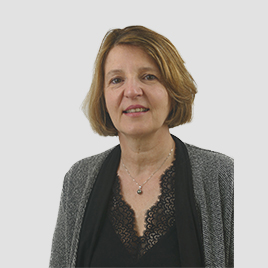 Valérie DOYE. After defending her doctoral thesis in 1991 at Pierre and Marie Curie University on the cellular differentiation of neurons, Valérie Doye completed a postdoctoral fellowship until 1994 at the European Molecular Biology Laboratory (Heidelberg, Germany). There, she specialized in nuclear pore components, nucleoporins, and their role in transport between the cytoplasm and the nucleus. In 1994, she joined the CNRS and then developed her research team at the Institut Curie, where she characterized the role of nucleoporins in the assembly of nuclear pores, as well as some of their unconventional functions in cell division and genome integrity. In 2008, she moved her team to the Institut Jacques Monod. In 2009, she received the CNRS Silver Medal for her research work. Head of the cell biology program and then a member of the Institut Jacques Monod’s management committee, she became deputy director in 2020 and director in 2023.
Valérie DOYE. After defending her doctoral thesis in 1991 at Pierre and Marie Curie University on the cellular differentiation of neurons, Valérie Doye completed a postdoctoral fellowship until 1994 at the European Molecular Biology Laboratory (Heidelberg, Germany). There, she specialized in nuclear pore components, nucleoporins, and their role in transport between the cytoplasm and the nucleus. In 1994, she joined the CNRS and then developed her research team at the Institut Curie, where she characterized the role of nucleoporins in the assembly of nuclear pores, as well as some of their unconventional functions in cell division and genome integrity. In 2008, she moved her team to the Institut Jacques Monod. In 2009, she received the CNRS Silver Medal for her research work. Head of the cell biology program and then a member of the Institut Jacques Monod’s management committee, she became deputy director in 2020 and director in 2023.
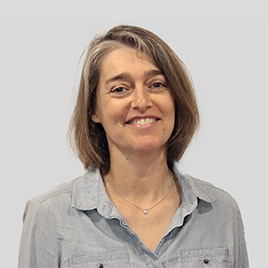 Sandra DUHARCOURT is a Research Director at the CNRS and head of the “Programmed DNA Elimination” team. After completing her PhD at Sorbonne University and a postdoctoral fellowship at the Fred Hutchinson Cancer Research Center (Seattle, USA), she became a researcher at the CNRS and established her research group at the Institut Jacques Monod in 2011. She received the CNRS Silver Medal in 2022 and was elected a member of EMBO in 2023. Her team is interested in the fundamental principles that control genome stability in eukaryotes and is studying a remarkable process of programmed DNA elimination during development in the single-celled eukaryote Paramecium. Her team’s objectives are to identify all the sequences that are eliminated and describe their evolutionary trajectories; to understand the mechanisms controlling DNA elimination in the context of chromatin; and to identify the functions associated with this massive reorganization of the genome.
Sandra DUHARCOURT is a Research Director at the CNRS and head of the “Programmed DNA Elimination” team. After completing her PhD at Sorbonne University and a postdoctoral fellowship at the Fred Hutchinson Cancer Research Center (Seattle, USA), she became a researcher at the CNRS and established her research group at the Institut Jacques Monod in 2011. She received the CNRS Silver Medal in 2022 and was elected a member of EMBO in 2023. Her team is interested in the fundamental principles that control genome stability in eukaryotes and is studying a remarkable process of programmed DNA elimination during development in the single-celled eukaryote Paramecium. Her team’s objectives are to identify all the sequences that are eliminated and describe their evolutionary trajectories; to understand the mechanisms controlling DNA elimination in the context of chromatin; and to identify the functions associated with this massive reorganization of the genome.
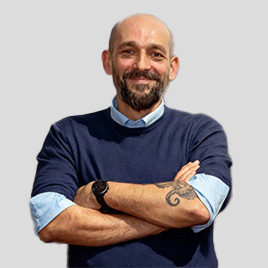 Julien DUMONT is a Research Director at the CNRS and heads the “Cell Division & Reproduction” team. After completing his PhD at Sorbonne University and a postdoctoral fellowship at UCSD’s Ludwig Institute for Cancer Research (San Diego, USA), he established his research group at the IJM in 2011. By combining innovative approaches and the study of model and non-model nematode species, his team explores the fundamental mechanisms of cell division during reproduction, in particular chromosome segregation during female meiosis.
Julien DUMONT is a Research Director at the CNRS and heads the “Cell Division & Reproduction” team. After completing his PhD at Sorbonne University and a postdoctoral fellowship at UCSD’s Ludwig Institute for Cancer Research (San Diego, USA), he established his research group at the IJM in 2011. By combining innovative approaches and the study of model and non-model nematode species, his team explores the fundamental mechanisms of cell division during reproduction, in particular chromosome segregation during female meiosis.
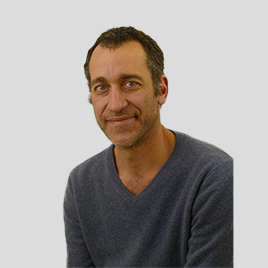 Nicolas MINC is a physicist and biologist. After defending his doctoral thesis at the Institut Curie in 2005, he completed a postdoctoral fellowship at Columbia University (New York, USA) and focused on cellular morphogenesis in yeast and sea urchin embryos, combining approaches from physics. In 2013, he set up his research team, “Spatial Organization of the Cell,” at the Jacques Monod Institute. That same year, he received the Emergence(s) Award from the City of Paris. In 2014, he was awarded the ERC Consolidator Grant for the FORCASTER project: Force, Motion and Positioning of MT Asters; in 2018, he received the CNRS Bronze Medal, and in 2024, the “Impulscience” prize from the Bettencourt-Schueller Foundation.
Nicolas MINC is a physicist and biologist. After defending his doctoral thesis at the Institut Curie in 2005, he completed a postdoctoral fellowship at Columbia University (New York, USA) and focused on cellular morphogenesis in yeast and sea urchin embryos, combining approaches from physics. In 2013, he set up his research team, “Spatial Organization of the Cell,” at the Jacques Monod Institute. That same year, he received the Emergence(s) Award from the City of Paris. In 2014, he was awarded the ERC Consolidator Grant for the FORCASTER project: Force, Motion and Positioning of MT Asters; in 2018, he received the CNRS Bronze Medal, and in 2024, the “Impulscience” prize from the Bettencourt-Schueller Foundation.
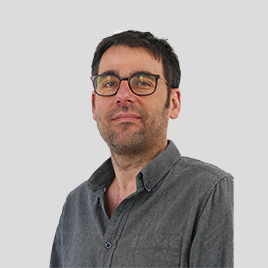 Benoît PALANCADE is a Research Director at the CNRS and head of the “RNA Biogenesis and Genome Homeostasis” team. After completing his thesis at the École Normale Supérieure in Paris and a postdoctoral fellowship at the Institut Curie, he became a researcher at the CNRS in 2007 and established his research group in 2018. His team is interested in the mechanisms that regulate the different stages of mRNA metabolism, from their synthesis in the nucleus to their export and translation in the cytoplasm, and their consequences on gene expression and the maintenance of genome stability.
Benoît PALANCADE is a Research Director at the CNRS and head of the “RNA Biogenesis and Genome Homeostasis” team. After completing his thesis at the École Normale Supérieure in Paris and a postdoctoral fellowship at the Institut Curie, he became a researcher at the CNRS in 2007 and established his research group in 2018. His team is interested in the mechanisms that regulate the different stages of mRNA metabolism, from their synthesis in the nucleus to their export and translation in the cytoplasm, and their consequences on gene expression and the maintenance of genome stability.
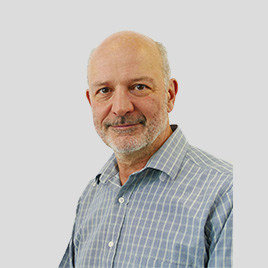 Jean-Marc VERBAVATZ is a professor of Cell Biology at Unviersité Paris Cité. He co-directs the “Membrane Dynamics and Intracellular Traffic” team with Cathy Jackson and co-directs the Imagoseine imaging platform with René-Marc Mège. He trained as an engineer at the École Centrale de Paris and obtained a PhD in Cell Biology from Pierre and Marie Curie University in 1990 for his work on water channels carried out at the CEA in Saclay. After a three-year postdoctoral fellowship in Dennis Brown’s laboratory at Massachusetts General Hospital (Harvard Medical School) in Boston, he was recruited in 1994 by the CEA in Saclay to the Department of Cellular and Molecular Biology, where he continued his work on aquaporins. In 2009, he joined the Max Planck Institute of Molecular Cell Biology and Genetics in Dresden to develop electron microscopy approaches in cell biology. In 2013, he became a professor of cell biology and team leader at the Institut Jacques Monod in 2015. His current projects focus on membrane trafficking and intracellular trafficking.
Jean-Marc VERBAVATZ is a professor of Cell Biology at Unviersité Paris Cité. He co-directs the “Membrane Dynamics and Intracellular Traffic” team with Cathy Jackson and co-directs the Imagoseine imaging platform with René-Marc Mège. He trained as an engineer at the École Centrale de Paris and obtained a PhD in Cell Biology from Pierre and Marie Curie University in 1990 for his work on water channels carried out at the CEA in Saclay. After a three-year postdoctoral fellowship in Dennis Brown’s laboratory at Massachusetts General Hospital (Harvard Medical School) in Boston, he was recruited in 1994 by the CEA in Saclay to the Department of Cellular and Molecular Biology, where he continued his work on aquaporins. In 2009, he joined the Max Planck Institute of Molecular Cell Biology and Genetics in Dresden to develop electron microscopy approaches in cell biology. In 2013, he became a professor of cell biology and team leader at the Institut Jacques Monod in 2015. His current projects focus on membrane trafficking and intracellular trafficking.
 Katja WASSMANN. After completing her PhD in 1996 at the IMP and the Biocenter in Vienna, Austria, where she worked on pheromone signaling in budding yeast, Katja Wassmann continued with her first postdoctoral training at MSKCC in New York, where she worked on spindle checkpoint control during mitosis. During a second postdoc in France, she specialized in the control of meiotic cell divisions in mammalian oocytes. Katja was awarded an Avenir grant in 2004, became a junior group leader at IBPS (Paris) in 2007, and was elected a member of Embo in 2023. Her team joined the Institut Jacques Monod in 2022, with projects focused on questions related to the ordering of key meiotic events during the two cell divisions in oocytes, in order to generate oocytes of correct ploidy. The team uses a combination of sophisticated imaging approaches, biochemistry, and global mass spectrometry analysis, and employs several model systems, such as budding yeast, Xenopus laevis, and mouse oocytes.
Katja WASSMANN. After completing her PhD in 1996 at the IMP and the Biocenter in Vienna, Austria, where she worked on pheromone signaling in budding yeast, Katja Wassmann continued with her first postdoctoral training at MSKCC in New York, where she worked on spindle checkpoint control during mitosis. During a second postdoc in France, she specialized in the control of meiotic cell divisions in mammalian oocytes. Katja was awarded an Avenir grant in 2004, became a junior group leader at IBPS (Paris) in 2007, and was elected a member of Embo in 2023. Her team joined the Institut Jacques Monod in 2022, with projects focused on questions related to the ordering of key meiotic events during the two cell divisions in oocytes, in order to generate oocytes of correct ploidy. The team uses a combination of sophisticated imaging approaches, biochemistry, and global mass spectrometry analysis, and employs several model systems, such as budding yeast, Xenopus laevis, and mouse oocytes.
 Zoubeir ZADVAT is the General Secretary of the Institut Jacques Monod since January 2024
Zoubeir ZADVAT is the General Secretary of the Institut Jacques Monod since January 2024
Referents within the institute:
- Open science referent: Antoine Jégou / Joel Marchand
- Parity referent: Nicolas Minc
- International correspondent/CNRS: Juliette Azimzadeh
- Sustainable Development Officer: Green committee
- Valuation Correspondent: Nicolas Minc
- Communication : Charlotte Brancaz
- Training Correspondent: Géraldine Thouvay
- Prevention assistants: Annie Dutriaux
- IJM Representative for ipOP-UP: Nikos Konstantides, Joël Marchand, Julien Dumont
The High Council for the Evaluation of Research and Higher Education (Hcéres) is the independent administrative authority responsible for evaluating all higher education and research structures.

You can consult the latest evaluation report (2023) of the Jacques Monod Institute on the HCERES’ website.
Tutelles
Université Paris Cité
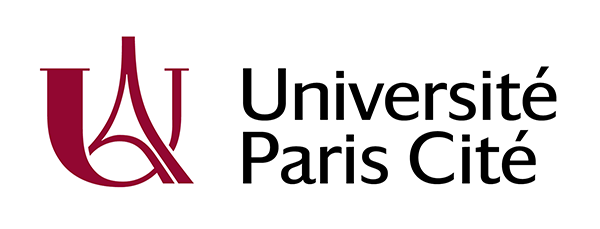 Forte de ses 63 000 étudiants et étudiantes, 4 608 chercheurs et enseignants-chercheurs, 2 704 personnels administratifs et techniques et 119 structures et unités de recherche, Université Paris Cité participe à l’incarnation d’une ville monde, consciente de sa place et de ses missions, ouverte sur le monde, la jeunesse et les savoirs.
Forte de ses 63 000 étudiants et étudiantes, 4 608 chercheurs et enseignants-chercheurs, 2 704 personnels administratifs et techniques et 119 structures et unités de recherche, Université Paris Cité participe à l’incarnation d’une ville monde, consciente de sa place et de ses missions, ouverte sur le monde, la jeunesse et les savoirs.
Dans un paysage français qui se restructure en grands pôles, avec l’ambition de recréer en France plusieurs universités de rang mondial, Université Paris Cité représente une force de tout premier plan en recherche, déjà très visible nationalement et internationalement.
Avec 12 100 étudiants et étudiantes, 50 laboratoires de recherche et 3 450 chercheurs, enseignants-chercheurs, personnels administratifs et techniques, la Faculté des Sciences est une des trois grandes facultés d’Université Paris Cité.
Elle est constituée de neuf composantes : cinq UFR sont localisées sur le campus des Grands Moulins (UFR de Chimie, Informatique, Mathématiques, Sciences de la Vie, Physique) ainsi qu’une école d’ingénieur. Le campus Saint-Germain des Prés accueille les UFR de Sciences Fondamentales et Biomédicales et l’UFR de Mathématiques/Informatique. La ZAC Pajol, quant à elle, héberge l’IUT de Paris Pajol.
La Faculté des Sciences allie les sciences expérimentales aux sciences exactes, la recherche fondamentale à la recherche appliquée. Elle dispose d’une très grande richesse disciplinaire à l’image de la biologie, la chimie, l’informatique, les mathématiques, la physique ou encore les sciences biomédicales.
CNRS
Le Centre national de la recherche scientifique est une institution de recherche parmi les plus importantes au monde. Pour relever les grands défis présents et à venir, ses scientifiques explorent le vivant, la matière, l’Univers et le fonctionnement des sociétés humaines. Internationalement reconnu pour l’excellence de ses travaux scientifiques, le CNRS est une référence aussi bien dans l’univers de la recherche et développement que pour le grand public.
L’Institut Jacques Monod est rattaché à l’Institut des sciences biologiques (INSB). Pour explorer et décrire le vivant, comme pour décrypter son fonctionnement, l’INSB encourage une recherche de prise de risque motivée par la curiosité. Il favorise le croisement des disciplines, accompagne les évolutions technologiques et soutient les collaborations internationales. L’institut est ainsi devenu un acteur majeur des progrès des sciences biologiques sur la scène mondiale.
Partenaires et soutiens
Inserm
Créé en 1964, l’Inserm est un établissement public à caractère scientifique et technologique, placé sous la double tutelle du ministère de la Santé et du ministère de la Recherche. Dédié à la recherche biologique, médicale et à la santé humaine, il se positionne sur l’ensemble du parcours allant du laboratoire de recherche au lit du patient. Sur la scène internationale, il est le partenaire des plus grandes institutions engagées dans les défis et progrès scientifiques de ces domaines.
Fondation pour la Recherche Médicale (FRM)
Au service de la recherche et de la santé depuis plus de 70 ans, la Fondation pour la Recherche Médicale (FRM) est le plus important financeur caritatif de la recherche médicale française sur toutes les pathologies : cancers, maladie d’Alzheimer, maladies cardiovasculaires, maladies infectieuses, diabète, sclérose en plaques, maladie de Parkinson, maladies rares…
Elle soutient chaque année plus de 400 nouvelles recherches menées dans les laboratoires des organismes publics de recherche et d’enseignement supérieur (INSERM, CNRS, INRA, CEA, Universités, grandes écoles, établissements de santé…).
Indépendante, la FRM agit grâce à la générosité de ses donateurs, testateurs et partenaires.
La Fondation pour la Recherche Médicale est reconnue d’utilité publique et labellisée par le Don en Confiance.
Ligue contre le cancer
Créée en 1918, la Ligue contre le cancer est une association loi 1901 reconnue d’utilité publique ![]() reposant sur la générosité du public et sur l’engagement de ses bénévoles et salariés formés grâce à une école de formation agréée pour répondre aux besoins des personnes concernées par le cancer. Notre fédération, composée de 103 Comités départementaux présents sur tout le territoire national, est apolitique et indépendante financièrement.
reposant sur la générosité du public et sur l’engagement de ses bénévoles et salariés formés grâce à une école de formation agréée pour répondre aux besoins des personnes concernées par le cancer. Notre fédération, composée de 103 Comités départementaux présents sur tout le territoire national, est apolitique et indépendante financièrement.
Fondation ARC
La Fondation ARC a pour mission de lutter contre le cancer par la recherche. Forte d’une expertise nationale et internationale, elle met en œuvre une politique scientifique articulée autour de trois axes stratégiques répondant aux besoins et enjeux actuels de la recherche en cancérologie :
- Soutenir la recherche fondamentale pour accroitre les connaissances sur tous les cancers et dans tous les domaines scientifiques et médicaux : génétique, immunologie, biologie et métabolisme cellulaire, pharmacologie, etc.
- Accélérer la recherche clinique et translationnelle, en permettant l’accès de tous, enfants et adultes, aux innovations thérapeutiques.
- Faire émerger les talents en créant les conditions d’une recherche d’excellence et en s’appuyant sur une politique volontariste, de long terme, basée sur la formation, le repérage et l’attraction de nouvelles compétences.
La Fondation ARC entend notamment accélérer en priorité la recherche dans deux domaines prioritaires : le développement de thérapies innovantes en médecine de précision (thérapies ciblées, immunothérapies, chirurgie mini-invasive…) et la prise en charge des enfants et adolescents atteints de cancer.
Son action est menée en toute indépendance et couvre l’ensemble du territoire : guidée par l’intérêt général et l’excellence scientifique, elle identifie, sélectionne, finance et accompagne des programmes de recherche prometteurs.
INCa
L’Institut national du cancer (INCa) est l’agence d’expertise sanitaire et scientifique en cancérologie de l’État chargée de coordonner les actions de lutte contre le cancer. Créée par la loi de santé publique du 9 août 2004, elle est placée sous la tutelle conjointe du ministère des Solidarités et de la Santé d’une part, et du ministère de l’Enseignement supérieur, de la Recherche et de l’Innovation d’autre part.
Labex Who Am I?
Le Labex Who Am I? est un projet interdisciplinaire, regroupant des équipes de biologistes, physiciens, psychanalystes, historiens et philosophes des sciences autour de la question centrale de l’identité. Ensemble, nous explorons les déterminants de l’identité à diverses échelles (chimique, moléculaire, cellulaire et sociale) par des approches collaboratives.
Fondation Bettencourt Schueller
A la fois fondation familiale et fondation reconnue d’utilité publique depuis sa création, la Fondation Bettencourt Schueller entend “donner des ailes aux talents”, pour contribuer à la réussite et à l’influence de la France.
Pour cela, elle recherche, choisit, soutient, accompagne et valorise des femmes et des hommes qui imaginent aujourd’hui le monde de demain, dans trois domaines qui participent concrètement au bien commun : les sciences de la vie, les arts et la solidarité.
Fondation Groupama Santé
En 2000, à l’occasion de son centenaire, Groupama a choisi d’illustrer ses valeurs mutualistes de solidarité et de proximité en créant la Fondation Groupama. Cette fondation d’entreprise s’engage pour ” vaincre les maladies rares “.
Région Ile-de-France
La Région encourage l’innovation et la recherche et souhaite offrir aux étudiants et aux chercheurs les meilleures conditions de vie et de travail. Financement de Genopole, de Chaires d’excellence Blaise Pascal, de Domaine d’intérêt majeur (DIM), du Prix des Innovateurs, d’équipements scientifiques et techniques et d’incubateurs…
GIS IBiSA
Le GIS IBiSA soutient les investissements d’un large ensemble de plateformes et de ressources en biologie, santé et agronomie, ouvertes à la communauté scientifique.
La plateforme ProtéoSeine de l’Institut Jacques Monod a reçu le label IbiSA.
Idex université de Paris
Dans le cadre de son IdEx, Université de Paris met en œuvre des programmes innovants et structurants en matière de recherche, international, formation et vie étudiante, et transfert des savoirs. Ces programmes sont financés par les revenus issus d’une dotation accordée à l’IdEx Université Paris 2019 et sont déployés en collaboration avec les organismes de recherche et les établissements partenaires du consortium IdEx.
ANR
L’Agence nationale de la recherche (ANR) est un établissement public à caractère administratif, placé sous la tutelle du ministère de l’Enseignement supérieur, de la Recherche et de l’Innovation. L’Agence met en œuvre le financement de la recherche sur projets, pour les opérateurs publics en coopération entre eux ou avec des entreprises.
ERC (European Research Council)
The ERC’s mission is to encourage the highest quality research in Europe through competitive funding and to support investigator-driven frontier research across all fields, on the basis of scientific excellence.
GEFLUC PARIS ILE-DE-France
Depuis plus de 50 ans, les Entreprises contre le Cancer mobilisent le monde de l’entreprise dans la lutte contre le cancer autour de 3 priorités :
- Le soutien à l’innovation en cancérologie et aux chercheurs Made in France.
- Le plaidoyer en faveur d’une meilleure prise en compte de la réalité du cancer en entreprise.
- Animer la communauté des acteurs de la lutte contre le cancer en entreprise.
L’Association Française de l’Ataxie de Friedreich (AFAF)
L’Association française de l’ataxie de Friedreich a été créée le 17 janvier 1980 par Bernard Verne et Clémentine Oddos, atteints par la maladie. Elle rassemble plus de 900 adhérents dont 500 personnes ataxiques. Ses objectifs sont :
• Aider la recherche médicale, en participant à son financement et en collaborant à certaines études.
• Promouvoir l’information sur la maladie et le suivi.
• Créer des liens d’amitié entre les adhérents.
• Accompagner malades et familles dans leur quotidien par des informations et contacts divers.
Composed of international experts, the Scientific Advisory Board is consulted on the scientific strategy of the Institut Jacques Monod and assists the management in the preparation of the five-year contract and the HCERES report of the Institute, as well as in the evaluation of applications to the calls for leader groups.
PRESIDENT
 Philippe Pasero, Institut de Génétique Humaine (IGH) – Montpellier
Philippe Pasero, Institut de Génétique Humaine (IGH) – Montpellier
Philippe Pasero is director of the Institute of Human Genetics (IGH), Principal Investigator (DR1 Inserm) and is leading the team “Maintenance of genome integrity during DNA replication”. His team is interested in the molecular basis of tumorigenesis and the role of replicative stress in this process. His team is studying the causes of replication defects and their consequences for genome stability.
MEMBERS
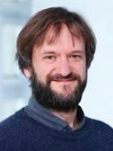 Yves Barral, ETH – Zurich
Yves Barral, ETH – Zurich
Yves Barral obtained his Ph.D. in 1994 from the Pierre und Marie Curie University in Paris. He then went on to work as a postdoctoral fellow and postdoctoral associate in the Department of Biology, Yale University (New Haven, USA) up until July 1999, focussing on the regulation of cellular morphogenese during cell division. At the ETH Prof. Barral will continue working on the coordination of the cytoskeleton and the cell cycle in yeast. He will also develop new genetic techniques to address related issues in the multicellular Nematode C.elegans.
 Buzz Baum, University College London (UCL) – London
Buzz Baum, University College London (UCL) – London
Buzz Baum studied Biochemistry at St Catherine’s College, Oxford. He did his PhD (1993-1997) with Paul Nurse at Cancer Research UK, UCL. From 1997-2001, he joined Norbert Perrimon at Harvard Medical School. In 2001, he was awarded a Royal Society URF at UCL and he was appointed as a group leader at UCL’s MRC Laboratory for Molecular Cell Biology in 2007. He was appointed Professor of Cell Biology in 2011. Since 2018, he has also been the director of the Institute for the Physics of Living Systems (IPLS).
Anne Ephrussi, The European Molecular Biology Laboratory (EMBL) – Heidelberg
Anne Ephrussi is director of EICAT, Head of developmental Biology Unit. Her unit dissects the mechanisms underlying intracellular RNA transport and localised translation – fundamental processes mediating the functional polarisation of cells during development and in the nervous system.
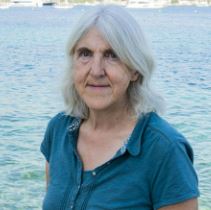 Evelyn Houliston, Laboratoire de Biologie du Développement de Villefranche-sur-mer (LBDV)
Evelyn Houliston, Laboratoire de Biologie du Développement de Villefranche-sur-mer (LBDV)
Evelyn Houliston est responsable de l’équipe “Mécanismes développementaux des cnidaires” , qui analyse les mécanismes de divers processus développementaux chez les cnidaires, en se servant principalement des méduses Clytia hemisphaerica (hydrozoaire) et Pelagia noctiluca (scyphozoaire)
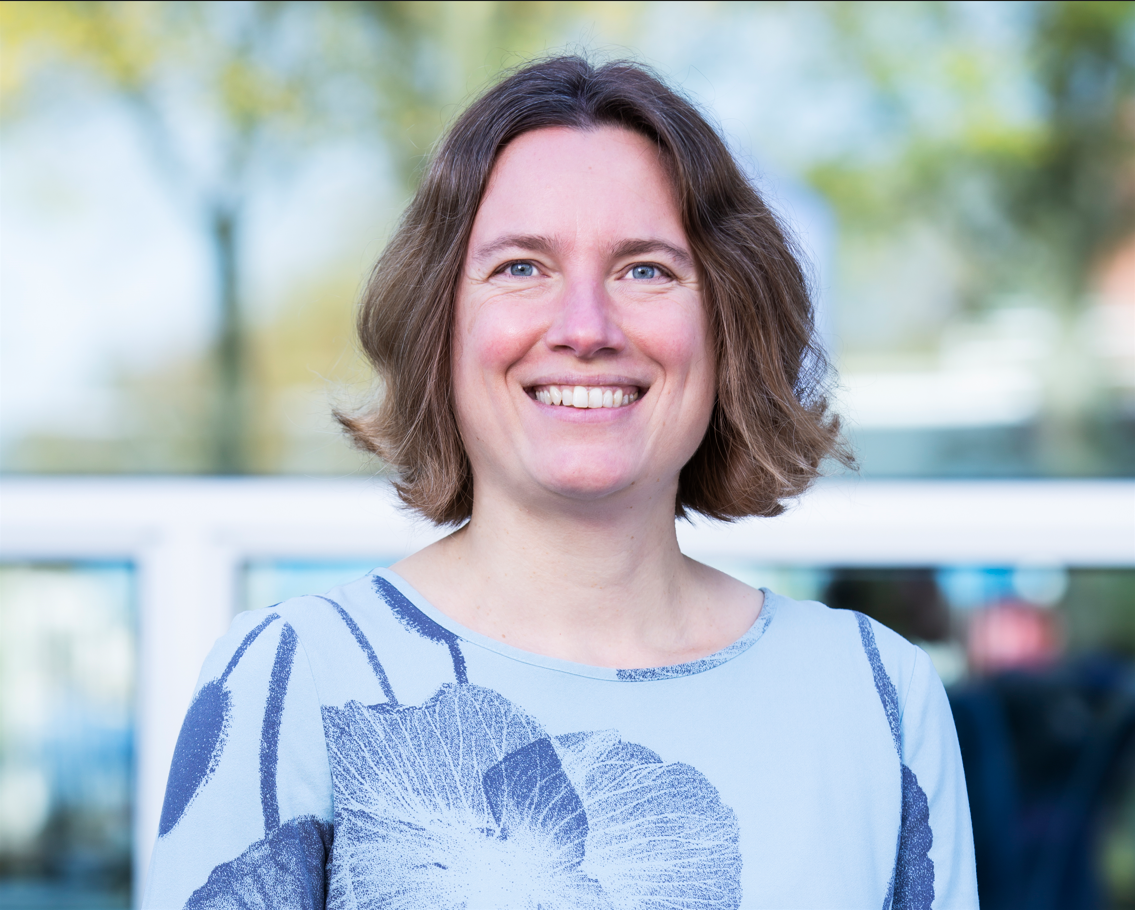 Gijsje Koenderink, Bionanoscience Department, TU Delft
Gijsje Koenderink, Bionanoscience Department, TU Delft
Prof. Dr. Gijsje Koenderink is full professor of cell biophysics at TU Delft where she heads an experimental research group aiming to understand the physical mechanisms that enable cells and tissues to combine mechanical strength with the ability to actively generate forces and change shape. Her team combines concepts and methods from soft matter physics, biophysics, synthetic biology, and mechanobiology. Her research also extends to biomedical implications of abnormal cell/tissue mechanics for cancer metastasis, fibrosis, and thrombosis.
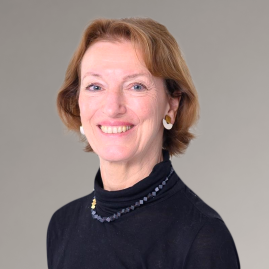 Maria Leptin, The European Molecular Biology Laboratory (EMBL) – Heidelberg
Maria Leptin, The European Molecular Biology Laboratory (EMBL) – Heidelberg
Prof. Maria Leptin has been the President of the European Research Council (ERC) since November 2021 and chairs the ERC’s governing body, the ERC Scientific Council. She is a biologist best known for her work on the mechanisms that allow a developing embryo to take on its correct shape. Before her appointment as ERC President, Maria Leptin was the Director of the European Molecular Biology Organisation (EMBO) in Heidelberg, and a research group leader at the European Molecular Biology Laboratory.
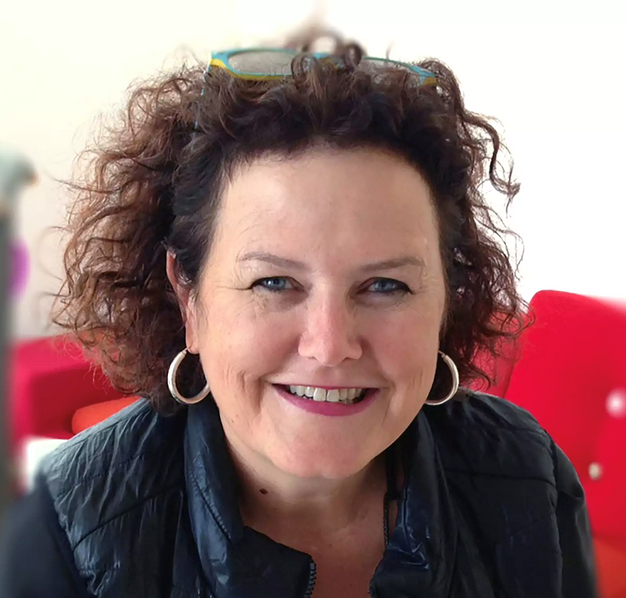 Erin Schuman, MPI for Brain Research, Frankfurt am Main, DE
Erin Schuman, MPI for Brain Research, Frankfurt am Main, DE
Erin Schuman lab’s long-standing research interest is the study of cellular mechanisms and neural circuits that underlie information processing and storage. The lab focuses on the molecular and cell biological processes that control protein synthesis and degradation in neurons and their synapses. The complex morphology of neurons, with most synapses located hundreds of microns from the cell body, presents a logistical challenge for the establishment, maintenance and modification of local synaptic proteomes. Neurons have solved this problem by localizing important cell biological machines, including ribosomes and proteasomes, within dendrites and axons.
 François Schweisguth, Institut Pasteur – Paris
François Schweisguth, Institut Pasteur – Paris
Francois Schweisguth is the Director of the CNRS UMR3738 (since 2011), the head of the BDCS Dept (since 2016), a co-coordinator the Labex REVIVE (since 2011) and a co-director of a Pasteur/REVIVE course on Stem Cell Biology (since 2013). His research focuses on the cell biology of Notch, the role of self-organization in the formation of developmental patterns, the control of cell fate and the regulation of epithelial morphogenesis using Drosophila as a model system.
Giorgio Scita, IFOM – Milano
Giorgio Scita is head of the Mechanisms of Tumor Cell Migration research unit at IFOM (the FIRC Institute of Molecular Oncology) in Milan, Italy. His research focuses on membrane and actin dynamics during cell migration and invasion, in particular during carcinogenesis. He has pioneered a mechano-biological approach to understanding cell dynamics in epithelial monolayers and in developing tumors, notably comparing these changes in cell behavior to a phase transition between solid-like” and “fluid-like” states. Dr Scita also discovered the fundamental connection between tumor cell mobility and endocytosis. He has been a group leader at IFOM since 2001, and was elected an EMBO member in 2014. He is also Full Professor of General Pathology at the Department of Oncology and Hemato-oncology, at the University of Milan.
Bertrand Séraphin, Institut de génétique et de biologie moléculaire et cellulaire (IGBMC) – Strasbourg
Bertrand Séraphin est Directeur de Recherche CNRS à l’IGBMC. Il a reçu de nombreux prix nationaux et internationaux, y compris une nomination au titre d’« Inventeur européen de l’année » de l’Office européen des brevets en 2008, la médaille d’argent du CNRS en 2007, et le prix Pierce de l’International Society for Molecular Recognition en 2005. Il a été élu membre de l’EMBO en 2000. Il a également reçu le prix Émilia Valori de l’Académie des sciences en 2014.


